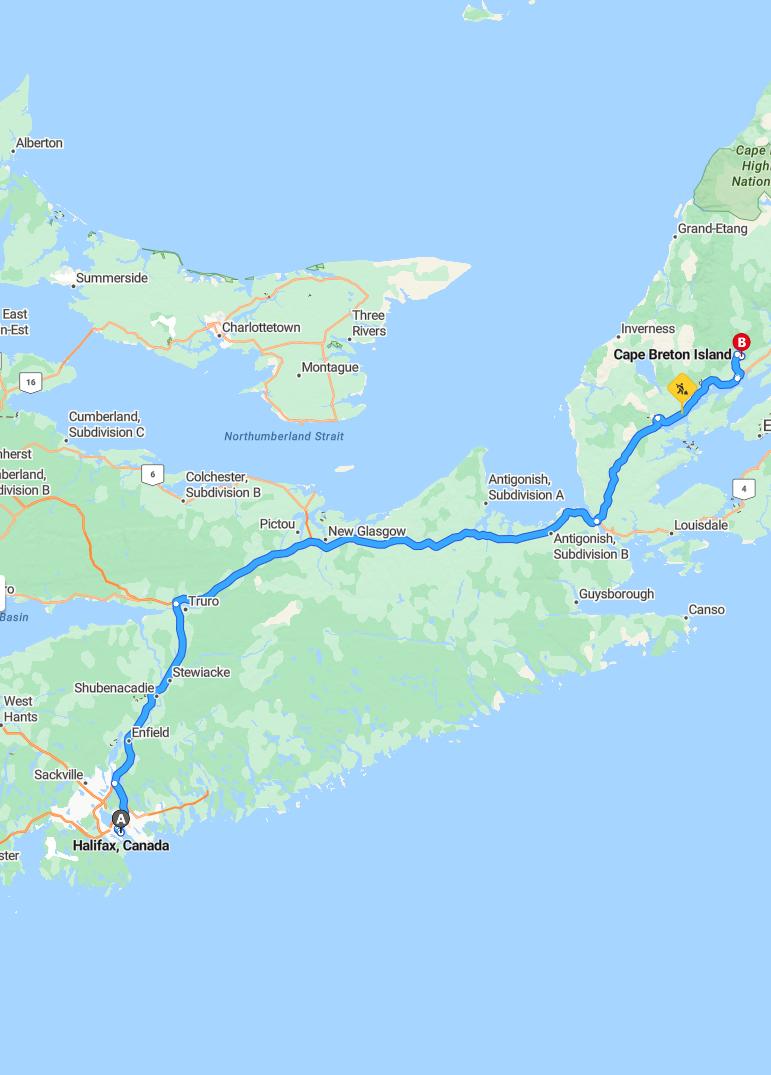Distance and estimated driving time
The drive from Halifax to Cape Breton Island typically takes approximately 3 hours and 40 minutes, covering about 224 miles under light traffic conditions. This scenic route offers travelers a comfortable and efficient journey between the two destinations. Planning ahead can ensure a smooth trip, with potential stops along the way to enjoy local sights. Overall, this route provides a convenient and picturesque connection to Cape Breton Island from Halifax.
Driving route
Traveling from Halifax to Cape Breton Island offers a scenic and diverse journey through Nova Scotia's picturesque towns and landscapes. Starting in Halifax, you'll pass through Sackville, Enfield, and Shubenacadie, each offering unique local attractions and cultural insights. Continuing on, the route takes you through Stewiacke, Truro, Pictou, and New Glasgow, showcasing vibrant communities and historic sites along the way. As you approach Antigonish and Guyborough, the scenic beauty intensifies, culminating in a visit to Eskasoni 3 before reaching the stunning Cape Breton Island. This route combines natural beauty, cultural richness, and charming stops, making it an unforgettable road trip experience.

Best time to travel
The best time to drive from Halifax to Cape Breton Island is during late spring through early fall, roughly from May to October, when the weather is generally mild and conducive to a comfortable journey. Traveling in these months allows travelers to enjoy scenic views without the challenges of winter snow or ice, and many attractions are more accessible and open. Summer months, especially July and August, are ideal for exploring outdoor activities but can be busier with tourists, so early mornings or weekdays are recommended for a more peaceful experience. Planning your trip during the shoulder seasons of late spring or early fall can offer a pleasant balance of good weather and fewer crowds, making your drive along key stops like Truro, Pictou, and Antigonish more enjoyable.
Road conditions and safety tips
The drive from Halifax to Cape Breton Island offers a scenic journey through rural and coastal areas, but travelers should remain cautious regarding road conditions, which can vary seasonally. In winter, icy patches and snow accumulation are common, so it's essential to drive at reduced speeds and maintain safe following distances. During rainy or foggy conditions, visibility may decrease, making it vital to use headlights and stay alert to changing traffic patterns. Always check local weather forecasts before departure and ensure your vehicle is well-maintained, with tires and brakes in good condition, to ensure a safe and enjoyable trip.
Scenic spots along the route
As you drive from Halifax to Cape Breton Island, you'll encounter several scenic spots worth exploring. Starting in Halifax, the picturesque waterfront offers stunning views of the harbor, while Sackville features charming rural landscapes. Enroute, Shubenacadie is famous for its lush wetlands and wildlife, and Truro boasts scenic areas like the Victoria Park Cataracts. Continuing on, Pictou presents beautiful coastal vistas, and New Glasgow captures the essence of Nova Scotia's rugged beauty. Approaching Cape Breton Island, Eskasoni offers a rich cultural experience set against a stunning natural backdrop, making the journey both visually delightful and culturally enriching.
Local attractions on Cape Breton Island
Cape Breton Island is renowned for its breathtaking natural beauty and rich cultural heritage. Visitors can explore the stunning Cabot Trail, which offers spectacular ocean views, scenic overlooks, and picturesque hiking trails. The island is also home to the historic Fortress of Louisbourg, a meticulously reconstructed 18th-century French fortress that offers a glimpse into colonial history. Additionally, the vibrant Celtic music scene and local festivals celebrate the island's Gaelic roots, providing an authentic cultural experience for all visitors.
Travel accommodations and lodging options
Traveling from Halifax to Cape Breton Island offers a variety of accommodations to suit different preferences. Along the route, travelers can find hotels, motels, and bed and breakfasts in towns such as Truro, New Glasgow, and Antigonish, providing comfortable and convenient options for overnight stays. Cape Breton Island itself boasts charming inns, cozy cottages, and scenic campgrounds that enhance the island's natural beauty and cultural experience. Whether seeking luxury amenities or budget-friendly accommodations, visitors can enjoy warm hospitality and scenic surroundings throughout their journey.
Recommended stops and rest areas
When driving from Halifax to Cape Breton Island, there are several recommended stops and rest areas to enhance your journey. Starting in Halifax, you might consider taking a break in Sackville or Enfield for refreshments and stretching. As you continue through Shubenacadie and Stewiacke, rest areas around Truro provide convenient spots to relax and refuel. Once near Pictou and New Glasgow, you can explore local attractions or use designated rest zones before reaching Antigonish, Guyborough, and Eskasoni, where additional scenic stops await along the way.
Weather forecast for travel days
Traveling from Halifax to Cape Breton Island, travelers can expect variable weather conditions along the route. In the upcoming days, the forecast indicates a mix of sunny spells and occasional rain showers, particularly around Truro and Pictou. Temperatures are predicted to be mild, ranging from cool mornings to warmer afternoons, which should make driving comfortable. However, it is advisable to stay updated on local weather alerts, especially near Eskasoni and Cape Breton Island, to ensure a safe and smooth journey.
Cultural and historical sites to visit
Traveling from Halifax to Cape Breton Island offers a rich cultural and historical experience, with numerous notable sites along the route. In Halifax, visitors can explore the Citadel Hill National Historic Site, showcasing the city's military heritage, and the Maritime Museum of the Atlantic, which highlights Nova Scotia's seafaring history. As you pass through towns like Pictou and New Glasgow, you can visit local museums and historic districts that celebrate the area's immigrant roots and industrial past. Continuing onto Cape Breton Island, highlights include the Alexander Graham Bell Museum in Baddeck and the Fortress of Louisbourg, a meticulously reconstructed 18th-century French fortress that provides a glimpse into colonial history.
